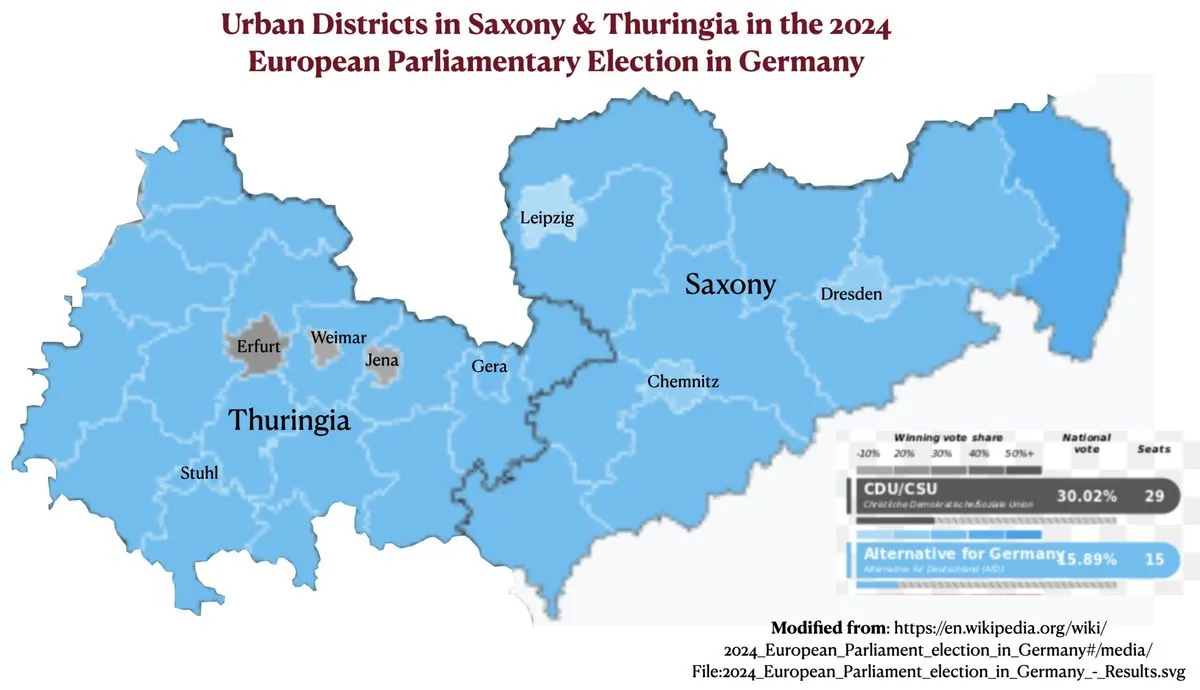In a significant political development, the Alternative for Germany (AfD) party has emerged as a frontrunner in recent regional elections held on September 1, 2024. This outcome marks a potential shift in Germany's political landscape, as the AfD could become the first far-right party to secure a regional election victory since the end of World War II.
Exit polls indicate that the AfD is projected to secure 33.5% of the vote in Thuringia, a central German state known for its picturesque forests and winter sports attractions. In the neighboring eastern state of Saxony, which borders Poland and the Czech Republic, the party is in a tight race, trailing the conservatives by a mere half percentage point.
The election results have significant implications for Chancellor Olaf Scholz's coalition government. While Scholz's Social Democrats (SPD) appear to have surpassed the crucial 5% threshold required to maintain representation in both state parliaments, his coalition partners face uncertain prospects. The Greens and the Free Democratic Party (FDP) may struggle to secure seats, potentially exacerbating tensions within the already fragile national coalition.
Despite the AfD's strong performance, other political entities have unanimously pledged to exclude the party from any coalition arrangements. This stance is rooted in the widespread perception of the AfD as an extremist and anti-democratic force. Founded in 2013, the AfD has been classified as a far-right and right-wing populist party, raising concerns about its potential influence on German politics.
The election also saw the debut of the Sahra Wagenknecht Alliance (BSW), a left-populist party that advocates for stricter immigration controls and opposes arming Ukraine in its ongoing conflict with Russia. While the BSW secured the third position in both states, its performance fell short of earlier predictions.
Germany's political system, which employs a mixed-member proportional representation model, includes safeguards against extremist parties. The country's post-war constitution was designed with these protections in mind, reflecting the nation's commitment to democratic values and stability.
As Germany approaches its national election, scheduled for 2025, these regional results serve as a barometer of public sentiment. The outcomes in Thuringia and Saxony may prompt a reevaluation of strategies among established parties, particularly the Christian Democratic Union (CDU), Germany's primary center-right party, and the governing coalition of SPD, Greens, and FDP.
The rise of the AfD and the BSW also reflects ongoing debates within German society regarding immigration policies and international relations, particularly concerning support for Ukraine. Germany has been a key ally for Ukraine in its conflict with Russia, a stance that has faced scrutiny from certain political quarters.
As the political landscape continues to evolve, the Bundestag, Germany's federal parliament in Berlin, will likely be the stage for intense debates on these critical issues. The coming months will be crucial in determining how Germany's established parties respond to the challenges posed by the far-right's growing electoral success.
